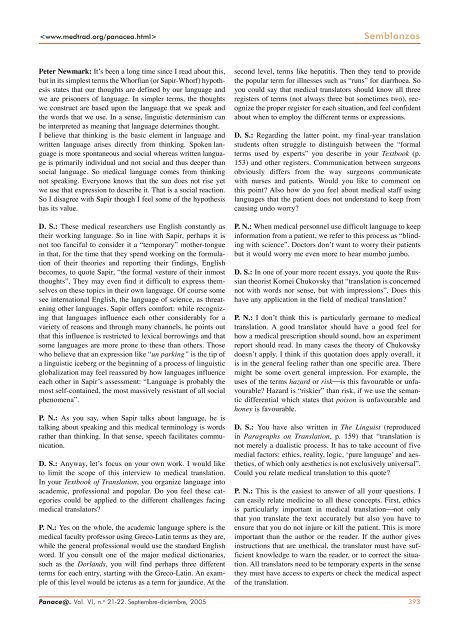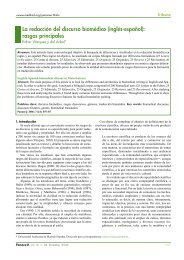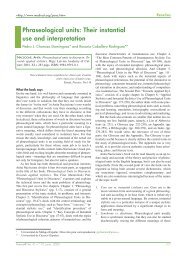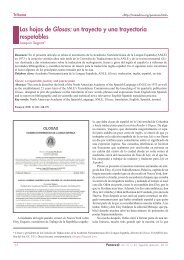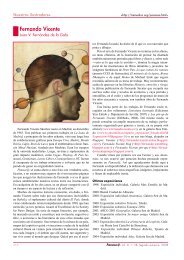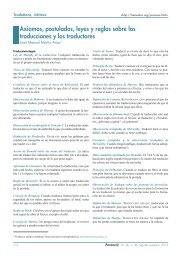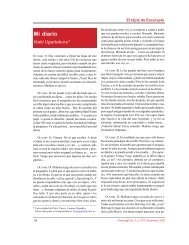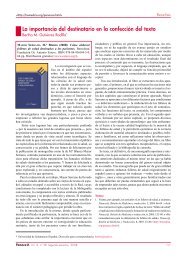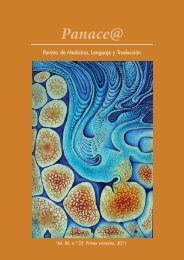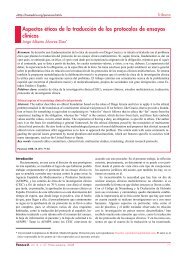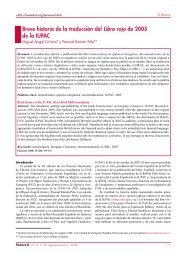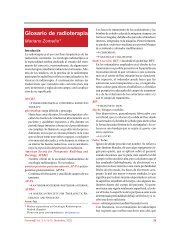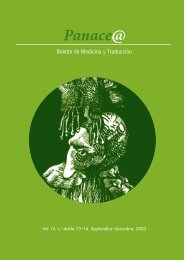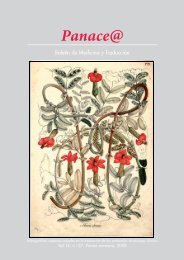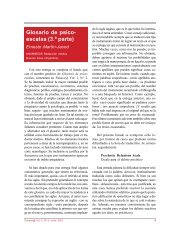You also want an ePaper? Increase the reach of your titles
YUMPU automatically turns print PDFs into web optimized ePapers that Google loves.
Semblanzas<br />
Peter Newmark: It’s been a long time since I read about this,<br />
but in its simplest terms the Whorfian (or Sapir-Whorf) hypothesis<br />
states that our thoughts are defined by our language and<br />
we are prisoners of language. In simpler terms, the thoughts<br />
we construct are based upon the language that we speak and<br />
the words that we use. In a sense, linguistic determinism can<br />
be interpreted as meaning that language determines thought.<br />
I believe that thinking is the basic element in language and<br />
written language arises directly from thinking. Spoken language<br />
is more spontaneous and social whereas written language<br />
is primarily individual and not social and thus deeper than<br />
social language. So medical language comes from thinking<br />
not speaking. Everyone knows that the sun does not rise yet<br />
we use that expression to describe it. That is a social reaction.<br />
So I disagree with Sapir though I feel some of the hypothesis<br />
has its value.<br />
D. S.: These medical researchers use English constantly as<br />
their working language. So in line with Sapir, perhaps it is<br />
not too fanciful to consider it a “temporary” mother-tongue<br />
in that, for the time that they spend working on the formulation<br />
of their theories and reporting their findings, English<br />
becomes, to quote Sapir, “the formal vesture of their inmost<br />
thoughts”. They may even find it difficult to express themselves<br />
on these topics in their own language. Of course some<br />
see international English, the language of science, as threatening<br />
other languages. Sapir offers comfort: while recognizing<br />
that languages influence each other considerably for a<br />
variety of reasons and through many channels, he points out<br />
that this influence is restricted to lexical borrowings and that<br />
some languages are more prone to these than others. Those<br />
who believe that an expression like “un parking” is the tip of<br />
a linguistic iceberg or the beginning of a process of linguistic<br />
globalization may feel reassured by how languages influence<br />
each other in Sapir’s assessment: “Language is probably the<br />
most self-contained, the most massively resistant of all social<br />
phenomena”.<br />
P. N.: As you say, when Sapir talks about language, he is<br />
talking about speaking and this medical terminology is words<br />
rather than thinking. In that sense, speech facilitates communication.<br />
D. S.: Anyway, let’s focus on your own work. I would like<br />
to limit the scope of this interview to medical translation.<br />
In your Textbook of Translation, you organize language into<br />
academic, professional and popular. Do you feel these categories<br />
could be applied to the different challenges facing<br />
medical translators?<br />
P. N.: Yes on the whole, the academic language sphere is the<br />
medical faculty professor using Greco-Latin terms as they are,<br />
while the general professional would use the standard English<br />
word. If you consult one of the major medical dictionaries,<br />
such as the Dorlands, you will find perhaps three different<br />
terms for each entry, starting with the Greco-Latin. An example<br />
of this level would be icterus as a term for jaundice. At the<br />
second level, terms like hepatitis. Then they tend to provide<br />
the popular term for illnesses such as “runs” for diarrhoea. So<br />
you could say that medical translators should know all three<br />
registers of terms (not always three but sometimes two), recognize<br />
the proper register for each situation, and feel confident<br />
about when to employ the different terms or expressions.<br />
D. S.: Regarding the latter point, my final-year translation<br />
students often struggle to distinguish between the “formal<br />
terms used by experts” you describe in your Textbook (p.<br />
153) and other registers. Communication between surgeons<br />
obviously differs from the way surgeons communicate<br />
with nurses and patients. Would you like to comment on<br />
this point? Also how do you feel about medical staff using<br />
languages that the patient does not understand to keep from<br />
causing undo worry?<br />
P. N.: When medical personnel use difficult language to keep<br />
information from a patient, we refer to this process as “blinding<br />
with science”. Doctors don’t want to worry their patients<br />
but it would worry me even more to hear mumbo jumbo.<br />
D. S.: In one of your more recent essays, you quote the Russian<br />
theorist Kornei Chukovsky that “translation is concerned<br />
not with words nor sense, but with impressions”. Does this<br />
have any application in the field of medical translation?<br />
P. N.: I don’t think this is particularly germane to medical<br />
translation. A good translator should have a good feel for<br />
how a medical prescription should sound, how an experiment<br />
report should read. In many cases the theory of Chukovsky<br />
doesn’t apply. I think if this quotation does apply overall, it<br />
is in the general feeling rather than one specific area. There<br />
might be some overt general impression. For example, the<br />
uses of the terms hazard or risk⎯is this favourable or unfavourable?<br />
Hazard is “riskier” than risk, if we use the semantic<br />
differential which states that poison is unfavourable and<br />
honey is favourable.<br />
D. S.: You have also written in The Linguist (reproduced<br />
in Paragraphs on Translation, p. 159) that “translation is<br />
not merely a dualistic process. It has to take account of five<br />
medial factors: ethics, reality, logic, ‘pure language’ and aesthetics,<br />
of which only aesthetics is not exclusively universal”.<br />
Could you relate medical translation to this quote?<br />
P. N.: This is the easiest to answer of all your questions. I<br />
can easily relate medicine to all these concepts. First, ethics<br />
is particularly important in medical translation⎯not only<br />
that you translate the text accurately but also you have to<br />
ensure that you do not injure or kill the patient. This is more<br />
important than the author or the reader. If the author gives<br />
instructions that are unethical, the translator must have sufficient<br />
knowledge to warn the reader, or to correct the situation.<br />
All translators need to be temporary experts in the sense<br />
they must have access to experts or check the medical aspect<br />
of the translation.<br />
Panace@. Vol. VI, n. o 21-22. Septiembre-diciembre, 2005 393


